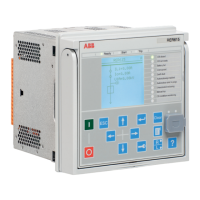For fault direction determination, the fundamental frequency admittance and
harmonic susceptances are summed together in phasor format. The result is the
sum admittance phasor defined as below.
Y Y j Y Y G j B
osum
n
n
o osum
=
+ ⋅ +
= + ⋅
=
∑
Re Im
0
1
0
1
0
2
9
1
(Equation 34)
The polarity of the polarizing quantity (residual voltage) can be changed
(rotated by 180 degrees) by setting the
Pol reversal
parameter to "True"
or by switching the polarity of the residual voltage measurement wires.
Fault direction determination
If an earth fault is detected by the GFC module, the fault direction is evaluated
based on the calculated sum admittance phasor
obtained from the Multi-
frequency admittance calculation module. To obtain dependable and secure fault
direction determination regardless of the fault type (transient, intermittent,
restriking, permanent, high or low ohmic), the fault direction is calculated using
a special filtering algorithm, Cumulative Phasor Summing (CPS) technique. This
filtering method is advantageous during transient, intermittent and restriking earth
faults with dominantly non-sinusoidal or transient content. It is equally valid during
continuous (stable) earth faults.
The concept of CPS is illustrated in
Figure 196
. It is the result of adding values of
the measured sum admittance phasors together in phasor format in chronological
order during the fault. Using the discrete sum admittance phasors
in different
time instants (t
1
...t
5
), the corresponding accumulated sum admittance phasor
is calculated. This phasor is used as directional phasor in determining the
direction of the fault.
Y t Y t
osum CPS osum_
( ) ( )
1 1
=
(Equation 35)
Y t Y t Y t
osum CPS osum osum_
( ) ( ) ( )
2 1 2
= +
(Equation 36)
Y t Y t Y t Y t
osum CPS osum osum osum_
( ) ( ) ( ) ( )
3 1 2 3
= + +
(Equation 37)
Y t Y t Y t Y t Y t
osum CPS osum osum osum osum_
( ) ( ) ( ) ( ) ( )
4 1 2 3 4
= + + +
(Equation 38)
Protection functions
1MRS758755 C
392 REC615 & RER615
Technical Manual

